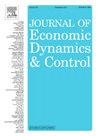风险可控的动态激励契约
IF 2.3
3区 经济学
Q2 ECONOMICS
引用次数: 0
摘要
我们解决了一个动态承包模型,其中委托人雇佣代理人来管理项目。关键的新因素是委托方或代理方都可以动态控制项目风险。增加风险有三种影响:(i)由于风险溢价而产生的正漂移效应,(ii)捕获风险转移引起的低效率的负漂移效应,以及(iii)机械均值保持价差效应。结果表明,由委托方而不是代理方控制风险,可以获得更高的合同效率。代理人承诺的价值越高,优势就越明显。风险的不可收缩性诱发了代理人的冒险行为。由于无储蓄激励的额外成本,外生无储蓄环境下的契约效率高于内生无储蓄环境下的契约效率。这些发现有助于控制权的配置,提出了公司治理的视角。本文章由计算机程序翻译,如有差异,请以英文原文为准。
Dynamic incentive contracts with controllable risk
We address a dynamic contracting model in which a principal hires an agent to manage a project. The key new ingredient is that either the principal or the agent can dynamically control the project risk. Increasing the risk has three effects: (i) a positive drift effect due to the risk premium, (ii) a negative drift effect that captures inefficiencies arising from risk-shifting, and (iii) a mechanical mean-preserving spread effect. We show that if the principal instead of agent controls the risk, we get a higher contract efficiency. The higher the agent's promised value, the more pronounced the advantage. The non-contractibility of risk induces the agent's risk-taking behavior. The contract efficiency in the exogenous no-savings environment is higher than that in the endogenous one due to additional costs of no-savings incentives. These findings contribute to the allocation of control rights, bringing forth a corporate governance perspective.
求助全文
通过发布文献求助,成功后即可免费获取论文全文。
去求助
来源期刊

Journal of Economic Dynamics & Control
ECONOMICS-
CiteScore
3.10
自引率
10.50%
发文量
199
期刊介绍:
The journal provides an outlet for publication of research concerning all theoretical and empirical aspects of economic dynamics and control as well as the development and use of computational methods in economics and finance. Contributions regarding computational methods may include, but are not restricted to, artificial intelligence, databases, decision support systems, genetic algorithms, modelling languages, neural networks, numerical algorithms for optimization, control and equilibria, parallel computing and qualitative reasoning.
 求助内容:
求助内容: 应助结果提醒方式:
应助结果提醒方式:


